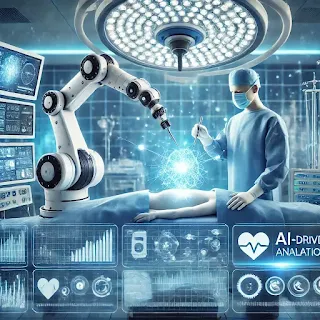The Future of AI Jobs: Opportunities and Challenges
- Get link
- X
- Other Apps
The Future of AI Jobs:
Opportunities and Challenges
Artificial intelligence (AI) is revolutionizing industries and redefining
the job market. While automation threatens certain roles, it also creates new
opportunities, making it essential for professionals to adapt. This article
explores the future of AI-driven careers, the impact of automation, and the
skills required to thrive in an AI-powered world.
The Rise of AI in Various Industries
AI has expanded beyond the tech industry, transforming sectors such as
healthcare, finance, transportation, and manufacturing. Companies are
leveraging AI to optimize processes, improve efficiency, and drive innovation.
Here are some key industries benefiting from AI:
1. Healthcare 🏥
AI-powered diagnostics, robotic-assisted surgeries, and predictive
analytics are enhancing healthcare delivery. AI can analyze massive datasets to
detect diseases early, recommend treatments, and improve patient outcomes.
Jobs in demand: AI healthcare specialists, medical data analysts, and bioinformatics
engineers.
 |
| AI-driven robotic surgery enhancing precision and patient care |
2. Finance 💰
AI is transforming the financial sector through algorithmic trading,
fraud detection, and AI-driven customer support. Banks and fintech companies
are using AI to assess credit risks and automate complex financial processes.
Jobs in demand: AI financial analysts, risk managers, and fintech developers.
🔗 Reference: AI in Finance
3. Transportation and Logistics 🚗🚚
Autonomous vehicles, AI-driven supply chain management, and drone
deliveries are reshaping the transportation industry. Companies like Tesla,
Waymo, and Amazon are investing heavily in AI-powered logistics solutions.
Jobs in demand: AI engineers, transportation analysts, and automation specialists.

AI-powered drone delivering a package
autonomously
4. Manufacturing 🏭
Smart factories equipped with AI-driven robots and IoT devices are
increasing productivity while reducing waste. AI specialists in automation,
predictive maintenance, and robotics engineering are in high demand.
🔗 Reference: AI in Manufacturing
AI’s Impact on the Job Market 📊
While AI will replace some jobs, it will also create new roles that
require advanced technical and analytical skills. Below is a comparison of jobs
at risk and emerging AI-powered roles:
|
Jobs at Risk |
Emerging AI-Powered Jobs |
|
Data Entry Clerks |
AI and Machine Learning Engineers |
|
Telemarketers |
AI Ethics Specialists |
|
Customer Support Agents |
AI-Powered Chatbot Developers |
|
Factory Workers |
Robotics Engineers |
|
Accountants (Basic Tasks) |
AI-Driven Financial Analysts |
Skills Needed for an AI-Driven Future 🎓
To remain competitive, professionals must develop new skills and embrace
lifelong learning. Key areas to focus on include:
1. Programming and Machine Learning 💻
Knowledge of Python, R, and Java is crucial. Understanding frameworks
like TensorFlow and PyTorch will provide a competitive edge.
2. Data Science and Analytics 📊
Since AI relies heavily on data, expertise in data wrangling, statistical
analysis, and visualization tools such as SQL, Tableau, and Power BI is
essential.
3. AI Ethics and Policy ⚖️
As AI becomes more prevalent, ethical concerns surrounding bias, privacy,
and transparency must be addressed. AI ethics specialists will play a crucial
role in ensuring fairness and accountability.
4. Soft Skills: Creativity, Critical
Thinking, and Emotional Intelligence 🧠
While AI automates repetitive tasks, human creativity and emotional
intelligence remain irreplaceable. Problem-solving and strategic thinking will
be key in AI-driven workplaces.
 |
| AI ethics specialists ensuring responsible AI development |
Preparing for AI-Driven Careers 🚀
To thrive in an AI-powered job market, professionals should adopt the
following strategies:
✅ Continuous Learning: Enroll in online AI courses through Coursera, Udemy, and edX.
✅ Networking: Join AI communities, attend conferences, and
participate in hackathons.
✅ Certifications: Obtain AI certifications from Google, Microsoft, and IBM.
✅ Hands-on Experience: Work on AI projects, contribute to
open-source communities, and gain practical experience through internships.
Conclusion 🏆
AI is reshaping the future of work, offering exciting opportunities while
posing significant challenges. By staying informed, upskilling, and adapting to
technological advancements, professionals can navigate the evolving job
landscape successfully. Those who embrace AI as a tool for progress will thrive
in the workforce of the future.
Sources:
·
World Economic Forum -
Future of Jobs Report
- McKinsey - AI and the Workforce
- Harvard
Business Review - AI Skills for the Future
- Get link
- X
- Other Apps




Comments
Post a Comment